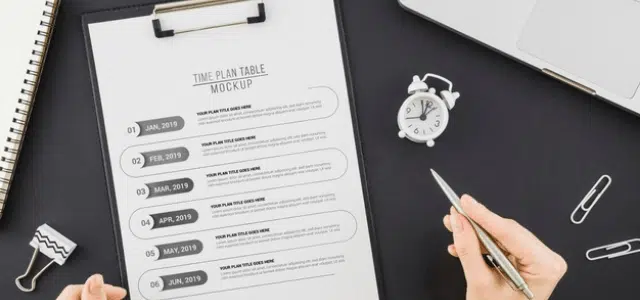“Self-study, in a sense of learning by yourself without anybody teaching you anything has an enormous value” This quote was written by Robert Kraft, a well-known American businessman. As the quote perfectly said, self-study and perfect time table for study is the most significant element in student life.
Students who do self-study in conjunction with their college/school studies, remember all things that are learned in class and achieve good grades. The more you study, the more likely you are to succeed.
The student's academic achievement is determined by how much he or she has studied. Students who study more earned higher grades than those who study less.
However, no studies can be completed completely without an adequate plan. In the same manner, students must plan their study time table properly to achieve good grades.
As a result, Setting up a time table for studies before an exam is a good practice.
To make the point more obvious, let’s know why a student should make a time table for study at home? And will learn how to make time table for exam.
Why Students Should Prepare a Study Time Table?

A proper time table for study is very important in student life. Just like school/college prepares a lecture schedule to keep their teaching process organized, students should prepare their study schedule to keep their study organized.
Due to the college hours and classwork, the student spends less time in their self-study than actual hours of study. This dilemma arises when students do not handle their time properly and do not take a task at a time.
As a result, students left with less time to learn. Therefore, a significant portion of the study was lost due to lack of time, causing students to feel depressed and think pessimistic prior to the exam. Due to which they receive lower test scores than they deserve.
But a proper study time table will assist students in managing their time for school/college homework, extracurricular activities, and social life.
It also serves as a reminder of your regular study commitment and allows you to monitor your progress.
You also get to know whether you are spending a lot of time on unnecessary activity or not taking a break much in the study hours.
After that, you can prepare a time table for study which will directly help you manage your time more effectively and manage the stress of study. Due to this all reason, a student should must prepare a time table for studies.
So now the issue is figuring out how to create an effective time table for study? Well, In this article, we will be discussing some tips for creating an effective study schedule.
Along with this, we have also prepared a weekly and exam time table for study which you can get at the end of this blog.
So let's first see the steps that must be followed for preparing an effective time table for study at home.
You might also like:
- 9+ Proven Ways to Study for Long Hours.
- Informal Letter Format: A Step-by-Step Guide (with Examples, and Samples).
Tips to Prepare a Perfect Time Table for Study.

1. Identify the Time of Study.
You must first determine which time of study fits you to create an ideal time table. Some people prefer to study early in the morning, while others prefer to study late at night.
It is up to you to decide when you want to study, and once you have done so, you must plan your most important study pieces for that period.
2. Identify Your Current Study Schedule.
To create a new study schedule, you must first find the flaws in your current study schedule.
Identify the things that make you disturb while study, whether you are taking lots of breaks during your study hours or spending lots of time in entertainment, or your study got messed up due to college/school classwork.
Once you have identified your flaws, strive to rearrange your study schedule to meet the requirements.
3. Identify Difficult and the Easiest Subjects.
In this step, you must determine which subjects are difficult for you and which subjects are easy for you.
Place your subject in a table in the order of hardest to easiest. After you've identified it, hold the subject that is the most difficult for you at the top and the subject that is the easiest for you at the bottom.
Once you have a list of the most difficult to the easiest subjects, the next task is that you should now devote more time to subjects that are difficult for you, and devote less time to easy subjects.
4. Identify the Important Date and Deadline.
When developing a time table for study at home, make a list of important dates, like project due dates, college trips, friend birthdays, and so forth.
As then, you don't forget the important date listed above, and so that you would not arrange some study plans for that particular day.
Project or task submissions need enough time in your study schedule because they carry marks in your academics. By forgetting these days, you would be ignoring the easiest way to earn marks.
5. Schedule Your Breaks.
Taking breaks is the most important part of studying for long hours. Taking a break in regular intervals keeps you fresh and avoids you feeling tired.
Simple activities will become even more difficult, and you will become depleted if you do not take a regular break in your long study schedule.
So take a regular break every hour of study to keep yourself refreshed for the next hour.
Get out of the study area and take a short walk outside, instead of using social media or watching a YouTube video during your break.
6. Set Your Goals.
Setting an academic goal is a very crucial step while preparing a study time table. You should note your expectation that must come by following this study time table.
This will help you know how effective the time table was at the end of your exam. If the time table meets your expectations, you should use it for future studies; if it does not, you should make a new, more effective one.
So far, I've mentioned a total of six steps that you should keep in mind when creating a best study time table.
The actual development of the study schedule will now begin. Let's look at how to create a perfect schedule for studying or best study time table.
How to Make an Effective Time Table for Study?
As a consequence, after referring to the above point you can now create a study schedule even easier.
You may create a research time table with paper and pen or online using MS Excel.
If you're going to make a time table with a pen and paper, keep it tidy, don't make it disoriented, and if you're going to make an excel file, take a print after preparing it.
Place your time table in front of your study desk, so you don't forget what you need to do next.
If you are not in your study place, try to remember the entire time table so that you always remember your next task.
After you've created your study schedule, you can think about a few things that will help you study more effectively and efficiently. Let's take a look at that.
Things to Remember after Preparing a Time Table for Study.
1. Stick to Your Time Table.
Stick to your plan once you've done setting your table. During your study time, do not engage in any extracurricular activities.
The most popular cause of study interruptions is your smartphone. So put your phone away and give yourself a small reward after each task is completed.
You will stick to your study schedule without being distracted if you use the methods mentioned above.
2. Check Your Weekly Progress.
After you've studied for a week, assess how much you've progressed from the previous week. by completing a self-assessment. This test can be performed on Sunday or possibly Saturday as well.
Due to the absence of school/college hours on Sunday and half-day on Saturday, some schools/colleges have a day off on Saturday.
You can give your mock test on the internet, where different mock test papers are available on the particular chapter that you can attend, and then check it yourself to see how much you have progressed?
3. Motivate Yourself
It will be difficult to stick to your study schedule at first until you have practiced it. It will take some time for the student to adjust. So, at first, you'll have to motivate yourself to stick to the schedule.
When you're bored, look at your target to keep you motivated. Place a motivational quote in front of your study area.
This quote will motivate you periodically and never make you feel lazy while studying and following the time table.
I believe you will be able to build a good study schedule if you follow all of the above steps.
I've made a schedule for the week, the weekend, and the days before leading up to an exam. As a result, you can use it to plan out your schedule for each scenario. Let's look at the weekday schedule first.
Don't miss:-
Time Table for Study for Weekday.
- 5:00 am - 5:40 am: Get up early and do the usual waking activities, such as bruising, etc.
- 5:40 am - 6:30 am: Revised the things that you’ve studied the day before.
- 6:30 am - 7:00 am: Have your breakfast and get ready for school/college.
- 7:00 am - 1:30 pm: In these hours, you will be at your college if I’m not wrong and till 1:30 pm, I aspect you will be reached at your home.
- 1.30 pm - 2:00 pm: Eat some food and relax.
- 2:00 pm - 2:50 pm: Revised the thing that is taught in the school on that day.
- 2:50 pm - 3:00 pm: Take a 10-minute break.
- 3:00 pm - 3:50 pm: Do your HW / Classwork on that day.
- 3:50 pm - 4:00 pm: Take 10 minutes break again.
- 4:00 pm - 6:00 pm: This time slot is for your coaching classes. If you are not having, then you take a quick nap and spend some time with your family.
- 6:00 pm - 6:55 pm: Begin studying the subject you've selected for that day.
- 6:55 pm - 7:05 pm: Take a 10-minute break.
- 7:05 pm - 8:00 pm: This is the second period of the day's scheduled subject.
- 8:00 pm - 8:10 pm: Take a 10-minute break.
- 8:10 pm - 9:00 pm: So according to your study time table, this is the third period of the assigned subject for that day.
- 9:00 pm - 9:30 pm: Have your dinner.
- 9:30 pm - 10: 45 pm: This is a long study duration during which you must complete all of your studies for that day.
- 10:45 pm: Go to bed.
A total of 6 hours of study time is allocated for each subject in this study time table.
Aside from that, 1 hour has been reserved for school/college classwork. 2 hours have been set aside for your extra coaching session, in addition, family time has been taken into consideration.
Study Time Table for a Weekend and Before the Exam.
- 5:00 am - 5:40 am: Get up early and do the usual waking activities, such as bruising, etc.
- 5:40 am - 6:30 am: Revised the things that you studied the day before.
- 6:30 am - 7:00 am: Take a shower and eat your breakfast.
- 7:00 am - 9:00 am: This time slot is allotted for college/school classwork or projects.
- 9:00 am - 9:10 am: Take a 10-minute break.
- 9:10 am - 11:00 am: Take your assessment.
- 11:00 am - 11:30 am: Have your lunch.
- 11:30 am - 12:30 pm: Study slot 1a.
- 12:30 pm - 12:40 pm: Take a 10-minute break.
- 12:40 pm - 1: 40 pm: Study slot 1b.
- 1:40 pm - 1:50 pm: Take a 10-minute break.
- 1:50 pm - 2:40 pm: Study slot 1c.
- 2:50 pm - 3:00 pm: Take a 10-minute break again.
- 3:00 pm - 4:00 pm: Take a small nap.
- 4:00 pm - 5:00 pm: You can begin studying for the second subject during this time period. i.e study slot 2b.
- 5:00 pm - 5:10 pm: Take a 10-minute break.
- 5:10 pm - 6:00 pm: Study slot 2b.
- 6:00 pm - 6:10 pm: Take a 10-minute break.
- 6:10 pm - 7:00 pm: Study slot 2c.
- 7:00 pm - 7:10 pm: A break of 10 minutes.
- 7:10 pm - 8:00 pm: Study slot 3a and now, start with a different subject.
- 8:00 pm - 8:10 pm: Take a break for 10 minutes.
- 8:10 pm - 9:00 pm: Study slot 3b.
- 9:00 pm - 9:30 pm: Have your dinner.
- 9:30 pm - 10:20 pm: Study slot 3c.
- 10:20 pm - 10:30 pm: Have a break for 10 minutes.
- Revise everything you learned that day before 11: 30 pm, and then have a good sleep.
For the weekend and before exam day, the above schedule can be observed. This schedule allows for more than 11 hours of self-study.
Apart from that, 2 hours have been set aside for self-assessment and 2 hours have been a reserve for college or school classwork
If you're studying for an exam, you can use those two hours of classwork for your study purpose. So, if you stick to the time table above, you can plan for the exam study for a total of 13 hours.
Time Table for Study: Wrap Up!
In this blog, I've discussed why self-study is important? And as well as six points for creating an effective time table for study.
I've also mentioned how to make a study schedule and also included a list of things to keep in mind after the preparation of the schedule.
A proper time table for the week and before the exam has been mentioned above, which you can follow by making some changes too.
I would not recommend you to refer to the above schedule only, you can make your own too.
Because each of you has a unique outlook and way of thinking, due to which you all are distinct from one another. In the same way, not all students will take the same path in self-study.
I hope this blog will assist and help you in creating a successful time table for study at home.
FAQs on Study Time Table.
Establish a daily habit in which you can study for at least 4 to 5 hours everyday in one location. Different types study time table are covered above. What matters is that studying becomes the focal point of your day and a consistent feature of your work week. Don't put off studying till exam time.
Here are some of our favorite methods to have fun while studying, no matter what subject you're studying?
- Listen to music that you enjoy.
- Make it a game with your friends.
- Make a game out of it for yourself.
- Put yourself to the test.
- Make use of high-quality stationery.
- Study at a different location.
- Make comic books, short novels, or music.
- Roleplaying is a fun way to learn new things.
- 5 hours of study time before lunch and 5 hours after lunch. This is the maximum amount of time you should spend studying per day.
- 8.5 hours of sleep per night, plus a 15-minute nap during the day.
- Morning workouts and evening walks are recommended.
- Breaks are taken frequently.
- There should be several topics to choose from.
The majority of board exam winners place a strong emphasis on revision. After you've studied or learned a specific topic, it is critical that you revise it periodically. Revision is more crucial than studying anything new during the last several months before board exams.
According to most sources, a normal undergraduate college student should study at least 2 hours per week outside of class per unit credit. This popular guideline says that a typical student should spend at least 8 hours outside of class each week studying for a 4 credit hour course.

About Me
Hello, I am Azad. I'm the man behind Growwpedia. I'm a Blogger, Affiliate Marketer and SEO expert.
Also I'm a student doing my B Tech in Computer Science from Mumbai University. I'm 19 years old guy.
I have a piece of very good knowledge about Education, Career & Business. So that you will find marvelous blogs on this topic. Know more about me here.


Thank you very much for sharing, I learned a lot from your article. Very cool. Thanks.